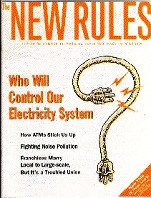State of Union Address that Could’ve Been
by David Morris
Institute for Local Self-Reliance
January 26, 1999 – published in St. Paul Pioneer Press
Something I’d liked to have heard in President Clinton’s State of the Union Address
Distinguished Members of Congress,
Three years ago I stood in this spot and declared “the era of big government is over”. Both sides of the aisle wildly cheered. But as everyone knows, talk is cheap in Washington. It is easy to talk about devolution or to declare, as Bob Dole did in his 1996 presidential campaign, “power to the people” when you believe the people will do exactly what you want. It is far more challenging to give people authority when they exercise it in ways with which you disagree.
Consider the case of medical marijuana. In the last few years, despite my and your vigorous objections, the American people have repeatedly and unequivocably spoken. They believe marijuana is a useful medicine, and they want doctors to be able to prescribe it.
Two years ago, by wide margins, the people of Arizona and Californa voted to legalize medical marijuana. The reaction by state and federal officials showed how little we truly believe our own rhetoric. The Arizona state legislature passed a law that nullified its citizens’ votes. California Attorney General Dan Lundgren sent his agents into communities to arrest those who acted on the new state law, even when city councils pleaded with him not to do so. The DEA threatened to revoke doctors privileges to prescribe medication if they prescribed pot. As a result of federal pressure, including legal action by the U.S. Department of Justice, 10 of the 13 original clubs formed in California to supply marijuana to the sick and the dying were closed.
Last September, with no public hearings, the House of Representatives voted 310 to 93 a “sense of the Congress” resolution that it is unequivocably opposed to medical marijuana. Indeed, in one instance, Congress even tried to prohibit people from having their voices heard on the issue when it barred the District of Columbia from spending any money to count the votes.
In November, the people responded. Arizonans overruled their state legislature and medical marijuana initiatives passed by a wide margin in every state in which it was on the ballot: Alaska, Colorado, Nevada, Oregon, Washington and based on exit polls, in the nation’s capital as well.
Californians showed Dan Lundgren the door when he ran for Governor and made Bill Lockyer their Attorney General. On Martin Luther King’s birthday, Lockyer announced his office will no longer prosecute people for distributing medical marijuana. “If we can give terminally ill people morphine, it seems we should be able to give them this medicine”, he said.
Governor Cayetano of Hawaii and Governor Ventura of Minnesota have announced their support for medical marijuana. Next year voters in Massachussets, Michigan, Ohio and Florida will almost certainly cast their votes in favor.
The people have spoken. Will we listen? We can argue that the effectiveness of medical marijuana has not been proven, yet for 2000 years cannabis was used as an herbal remedy. In the the 1920s marijuana was sold legally in U.S. drug stores as a treatment for asthma and migraine headaches and to ease the pain of childbirth.
In the 1980s six state health agencies conducted studies. The consensus was that marijuana is effective in reducing nausea and improving the appetites of cancer patients. A majority of cancer doctors surveyed indicated they would prescribe marijuana for their patients.
Last year the British House of Lords Science and Technology Committee, which was chaired by a pharmacologist and included a Nobel prize winning chemist and a former president of the General Medicine Council concluded, after a lengthy inquiry, that cannabis “almost certainly does have genuine medical applications”.
But why must we demand definitive, conclusive, uncontroverted, overwhelming, clinical evidence about the therapeutic effectiveness of medical marijuana before we abide by the will of the people? What bigger kind of government can there be than one that overrules the right of a community to allow a dying, paid ridden grandmother to ease her pain?
We are challenged by our citizens and own rhetoric. I accept that challenge.
I have ordered my drug chief, Barry McCaffrey and the DEA to stop undermining the use of medical marijuana in those states where initiatives have passed. I have ordered the DEA to move ahead to make marijuana a Schedule 2 rather than a Schedule 2 drug so that it can be prescribed by doctors. And I will shortly submit a bill to Congress that will give states the right to legalize medical marijuana. The people have spoken. I can do no less. Neither can you.
Thank you.



